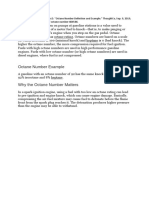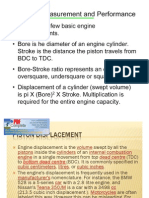0 ratings0% found this document useful (0 votes)
109 viewsOctane and Cetane Numbers: Activation Energies
Octane and Cetane Numbers: Activation Energies
Uploaded by
Casey Jane AguilarThe octane number measures a gasoline's resistance to detonation, with higher numbers indicating less likelihood of knocking. It represents the percentage of iso-octane in a mixture that matches the fuel's anti-knock properties. The cetane number measures a diesel's ignition delay, with higher numbers showing shorter delays. It denotes the percentage of cetane in a mixture matching the fuel's ignition characteristics. Both range from 0-100 and indicate a fuel's ignition delay time, with higher values increasing engine efficiency.
Copyright:
© All Rights Reserved
Available Formats
Download as DOCX, PDF, TXT or read online from Scribd
Octane and Cetane Numbers: Activation Energies
Octane and Cetane Numbers: Activation Energies
Uploaded by
Casey Jane Aguilar0 ratings0% found this document useful (0 votes)
109 views1 pageThe octane number measures a gasoline's resistance to detonation, with higher numbers indicating less likelihood of knocking. It represents the percentage of iso-octane in a mixture that matches the fuel's anti-knock properties. The cetane number measures a diesel's ignition delay, with higher numbers showing shorter delays. It denotes the percentage of cetane in a mixture matching the fuel's ignition characteristics. Both range from 0-100 and indicate a fuel's ignition delay time, with higher values increasing engine efficiency.
Original Description:
octane
Original Title
Octane and Cetane
Copyright
© © All Rights Reserved
Available Formats
DOCX, PDF, TXT or read online from Scribd
Share this document
Did you find this document useful?
Is this content inappropriate?
The octane number measures a gasoline's resistance to detonation, with higher numbers indicating less likelihood of knocking. It represents the percentage of iso-octane in a mixture that matches the fuel's anti-knock properties. The cetane number measures a diesel's ignition delay, with higher numbers showing shorter delays. It denotes the percentage of cetane in a mixture matching the fuel's ignition characteristics. Both range from 0-100 and indicate a fuel's ignition delay time, with higher values increasing engine efficiency.
Copyright:
© All Rights Reserved
Available Formats
Download as DOCX, PDF, TXT or read online from Scribd
Download as docx, pdf, or txt
0 ratings0% found this document useful (0 votes)
109 views1 pageOctane and Cetane Numbers: Activation Energies
Octane and Cetane Numbers: Activation Energies
Uploaded by
Casey Jane AguilarThe octane number measures a gasoline's resistance to detonation, with higher numbers indicating less likelihood of knocking. It represents the percentage of iso-octane in a mixture that matches the fuel's anti-knock properties. The cetane number measures a diesel's ignition delay, with higher numbers showing shorter delays. It denotes the percentage of cetane in a mixture matching the fuel's ignition characteristics. Both range from 0-100 and indicate a fuel's ignition delay time, with higher values increasing engine efficiency.
Copyright:
© All Rights Reserved
Available Formats
Download as DOCX, PDF, TXT or read online from Scribd
Download as docx, pdf, or txt
You are on page 1of 1
Casey Jane P.
Aguilar
26 September 2013
BSChE 3 Chem 85 A
Engr. Christylene Balagtas
Octane and Cetane Numbers
Octane number is defined as a number that is used to measure the antiknock properties of a liquid motor
fuel (as gasoline) with a higher number indicating a smaller likelihood of knocking or detonating which means
explosion caused by its premature burning in the combustion chamber. The higher value of octane number is usually
used in high compression engines which consequently have high performance and correlate to higher activation
energies: This being the amount of applied energy required to initiate combustion. Since higher octane fuels have
higher activation energy requirements, it is less likely that a given compression will cause uncontrolled ignition,
otherwise known as autoignition or detonation. The number also indicates how much fuel can be compressed before
it ignites and the percent by volume of iso-octane in a combustible mixture, which is iso-octane and normal heptane,
causing the anti-knocking properties to match the gas being tested.
On the other hand, cetane number is defined as the measurement of the combustion quality of diesel fuel
during compression ignition. It also denotes on the percentage by volume of cetane in a combustible mixture, which is
cetane or n-hexadecane and 1-methylnapthalene, whose ignition characteristics match those of the diesel fuel being
tested. Higher cetane fuels will have shorter ignition delay periods than lower cetane fuels, meaning the more easily
the fuel will combust in a compression setting (such as a diesel engine). The characteristic diesel "knock" occurs
when the first portion of fuel that has been injected into the cylinder suddenly ignites after an initial delay. Minimizing
this delay leads to less unburned fuel in the cylinder at the beginning and less intense knock. Therefore higher-cetane
fuel usually causes an engine to run more smoothly and quietly. Cetane numbers are only used for the relatively light
distillate diesel oils and additives like alkyl nitrates and di-tert-butyl peroxide can be used to raise the cetane number.
Comparing both, the octane number is used for gasoline while the cetane number is used for diesel fuel. In
the cetane number, the high numerical values indicate the tendency of the diesel fuel to ignite readily thus performing
better in the engine. On the contrary, in the octane number the high values shows the resistance of gasoline on
spontaneous ignition which leads to less tendency on detonating the engine. These values show the increasing
efficiency of the fuel. Despite their differences, they also have similarities. First, both their numbers range from 0
100 and secondly, a measure of a fuels ignition delay which is the time period between the start of injection and start
of combustion or ignition of the fuel resulting to the increased efficiency of the engine.
References:
1.
http://www.scribd.com/doc/7292781/Differences-Between-Octane-Number-and-Cetane-Number
2.
3.
(Date Accessed: 25 September 2013)
http://en.wikipedia.org/wiki/Octane_rating
(Date Accessed: 25 September 2013)
http://en.wikipedia.org/wiki/Cetane_number (Date Accessed: 25 September 2013)
You might also like
- Master Mf4700 WSM 01 enDocument422 pagesMaster Mf4700 WSM 01 enTan Jai88% (8)
- Cat c7 DiagramaDocument2 pagesCat c7 DiagramaJose F Rivera Morales89% (27)
- Parts Book For Iveco EngineDocument42 pagesParts Book For Iveco EngineHarrier Technologies80% (5)
- 80SA Manual de PeçasDocument584 pages80SA Manual de PeçasAlessandro GomesNo ratings yet
- Cetane NumberDocument4 pagesCetane NumberEmad AliNo ratings yet
- Terex RT 780. 80 Ton RTDocument20 pagesTerex RT 780. 80 Ton RTBhavana Kewlani67% (3)
- AST PF5 TimingToolsDocument152 pagesAST PF5 TimingToolsJoão Figueiredo100% (2)
- Differences Between Octane Number and Cetane NumberDocument2 pagesDifferences Between Octane Number and Cetane Numberapi-376413993% (55)
- Differences Between Octane Number and Cetane NumberDocument2 pagesDifferences Between Octane Number and Cetane Numberrakeshbiswa100% (1)
- Octane No.Document4 pagesOctane No.nafNo ratings yet
- Both Scales Were Developed So Thathigher Numbers Represent Higher Quality For The Respective Use, High Cetane Numberfuels HaveDocument3 pagesBoth Scales Were Developed So Thathigher Numbers Represent Higher Quality For The Respective Use, High Cetane Numberfuels HavekasiNo ratings yet
- Cetane NumberDocument2 pagesCetane NumberAjit TajaneNo ratings yet
- Octane NumberDocument4 pagesOctane NumberMm AbdulaNo ratings yet
- Octane NumberDocument7 pagesOctane NumberGabriel Sârbu100% (1)
- Octane RatingDocument3 pagesOctane Ratingtaufany99No ratings yet
- Octane NumbersDocument4 pagesOctane Numberssidaks6869No ratings yet
- Engineering Chemistry Assignment: Topic - Octane and Cetane NumbersDocument3 pagesEngineering Chemistry Assignment: Topic - Octane and Cetane NumbersGopa RayNo ratings yet
- Fat I Mad Ya A Saad Octane NumberDocument15 pagesFat I Mad Ya A Saad Octane NumberMalik HatemNo ratings yet
- Cetane & Octain RatingsDocument18 pagesCetane & Octain RatingsAnoj pahathkumburaNo ratings yet
- Octane RatingDocument7 pagesOctane RatingRanz Alton Tiu UrsalNo ratings yet
- Octane and Cetane NumberDocument7 pagesOctane and Cetane NumberAndreanusAaryNo ratings yet
- Octane RatingDocument17 pagesOctane RatingWira Sentanu0% (1)
- Octane Cetane NumberDocument2 pagesOctane Cetane NumberrocksNo ratings yet
- The Importance of Cetane Number in Diesel FuelDocument3 pagesThe Importance of Cetane Number in Diesel FuelRizwan FaridNo ratings yet
- Unisim SimulationDocument30 pagesUnisim SimulationZahid HussainNo ratings yet
- Diesel Fuel Cetane NumberDocument2 pagesDiesel Fuel Cetane NumbermdchetrNo ratings yet
- Palawan State UniversityDocument5 pagesPalawan State UniversityAizernerNo ratings yet
- Cetane NumberDocument4 pagesCetane NumberSudarshanBhardwajNo ratings yet
- Learning Activity SheetDocument15 pagesLearning Activity SheetStenyle BaloyoNo ratings yet
- High Octane FuelDocument9 pagesHigh Octane FuelPurna Satria NugrahaNo ratings yet
- 2.3 Properties of Liquid FuelDocument2 pages2.3 Properties of Liquid Fuelgiriaalik55No ratings yet
- Lecture - 2 Combustion Reaction of Engine FuelsDocument39 pagesLecture - 2 Combustion Reaction of Engine FuelsMuhammad SaqibNo ratings yet
- Compression and OctaneDocument2 pagesCompression and OctaneAgung BaskaraNo ratings yet
- 1.lec1 Fuels For Internal Combustion EnginesDocument41 pages1.lec1 Fuels For Internal Combustion EnginesMeroNarutoNo ratings yet
- Knocking-Octane Vs Centane RatingDocument11 pagesKnocking-Octane Vs Centane Ratinglingampallyprathyusha11No ratings yet
- 10.5. Ignition Delay: 10.5.1. Definition and DiscussionDocument14 pages10.5. Ignition Delay: 10.5.1. Definition and DiscussionDUVAN FELIPE MUNOZ GARCIANo ratings yet
- The Cetane Index Is A Figure Which Denotes The Quality of A Diesel FuelDocument4 pagesThe Cetane Index Is A Figure Which Denotes The Quality of A Diesel FuelAnwar SadatNo ratings yet
- Cetane Numbers AssignmentDocument2 pagesCetane Numbers AssignmentTony-Ubah ChiemeriwoNo ratings yet
- Fuels: Diesel, Gasoline and Hybrid EnginesDocument98 pagesFuels: Diesel, Gasoline and Hybrid EnginesMoriel J. NudoNo ratings yet
- Chapter2.4 Engine MeasurementDocument19 pagesChapter2.4 Engine MeasurementTun Seri ShahNo ratings yet
- Cetane Number: University of Karbala College of Engineering Third StageDocument7 pagesCetane Number: University of Karbala College of Engineering Third StageMohamed ModerNo ratings yet
- 6 - Products Blending - Additives - Section OneDocument6 pages6 - Products Blending - Additives - Section Onemohammedkhudhair20No ratings yet
- FuelDocument21 pagesFuelpnarwade502No ratings yet
- Sustainable Mobility: Week 2 - Session 3 - Fuels (Part2)Document7 pagesSustainable Mobility: Week 2 - Session 3 - Fuels (Part2)Ines B.No ratings yet
- Gasoline: PropertiesDocument15 pagesGasoline: Propertiesmradu1No ratings yet
- Knocking and Anti KnockingDocument26 pagesKnocking and Anti KnockingsaadzzworldNo ratings yet
- Introduction To Petroleum Technology - 2Document19 pagesIntroduction To Petroleum Technology - 2Anish VazeNo ratings yet
- Compression Ratio PDFDocument6 pagesCompression Ratio PDFRafael LuqueNo ratings yet
- Cetane NumberDocument5 pagesCetane NumbereliotroyanoNo ratings yet
- GasolineDocument1 pageGasolineapi-304963352No ratings yet
- Knocking and Knock Rating of FuelsDocument8 pagesKnocking and Knock Rating of FuelsShivananda BhatNo ratings yet
- Improved Performance of EGR ValvesDocument2 pagesImproved Performance of EGR ValvesWilson BuenoNo ratings yet
- Fuel Systems 1Document17 pagesFuel Systems 1Kishore Kumar NavaleNo ratings yet
- Experiment Number (7) Determination of Octane Number by Shatox Sx-100M InstrumentalDocument8 pagesExperiment Number (7) Determination of Octane Number by Shatox Sx-100M InstrumentalHevin HassanNo ratings yet
- Petrol Engines-Diesel EnginesDocument10 pagesPetrol Engines-Diesel EnginesAli Mohamed KhalilNo ratings yet
- Diesel Fuel 1Document58 pagesDiesel Fuel 1Pradeep MunnaNo ratings yet
- Octane Number of Gasoline PDFDocument2 pagesOctane Number of Gasoline PDFJamesNo ratings yet
- Thermochemistry & Fuels.8 Dec 19Document60 pagesThermochemistry & Fuels.8 Dec 19Jawad AhmedNo ratings yet
- Fuels CLRDocument6 pagesFuels CLRZohaib Anis KundaNo ratings yet
- The Basic of FluidDocument17 pagesThe Basic of FluidAditya AfandiNo ratings yet
- FuelsDocument44 pagesFuelsfirst lastNo ratings yet
- Property Lab 7Document6 pagesProperty Lab 7Lulav BarwaryNo ratings yet
- Noel Bezaire, Kapila Wadumesthrige, K.Y. Simon NG, Steven O. SalleyDocument7 pagesNoel Bezaire, Kapila Wadumesthrige, K.Y. Simon NG, Steven O. SalleyJames VeraNo ratings yet
- Fuels B&WDocument6 pagesFuels B&WSara KhanNo ratings yet
- Fuel Dilution in Gasoline Engines From Direct InjectionDocument2 pagesFuel Dilution in Gasoline Engines From Direct InjectionRafael Nakazato RecioNo ratings yet
- Comparison of Diesel and Petrol EnginesFrom EverandComparison of Diesel and Petrol EnginesRating: 2.5 out of 5 stars2.5/5 (3)
- 'Electric Vehicle'': A Seminar OnDocument21 pages'Electric Vehicle'': A Seminar OnVishal Dagade50% (2)
- Siemens MS 43Document20 pagesSiemens MS 43Rómulo Simón Lizarraga León100% (1)
- ZF 16s 151 Od 1315 051 393 2004 Spare Parts CatalogDocument5 pagesZF 16s 151 Od 1315 051 393 2004 Spare Parts CatalogRobert100% (63)
- Manual Servicio SubaruDocument5,963 pagesManual Servicio SubaruCristian Mauricio Alarcon RojasNo ratings yet
- Product Brochure Volvo A45GFSDocument12 pagesProduct Brochure Volvo A45GFSmnowaqNo ratings yet
- JC-70DB8 Drawwork Drawing and Patrs List - 1Document27 pagesJC-70DB8 Drawwork Drawing and Patrs List - 1waleedNo ratings yet
- 2021 - 12 - 11 - 11 - 57 - Renault Prem 450 Dxi - 2008Document18 pages2021 - 12 - 11 - 11 - 57 - Renault Prem 450 Dxi - 2008AtochkavNo ratings yet
- 196 The 1.4-ltr. 16V 55kW Engine With Roller-Type Cam Follower PDFDocument36 pages196 The 1.4-ltr. 16V 55kW Engine With Roller-Type Cam Follower PDFAllan CancinoNo ratings yet
- App - Flutter02a PC Grand PDFDocument62 pagesApp - Flutter02a PC Grand PDFegha fajarNo ratings yet
- PDFDocument17 pagesPDFGermautos VolkswagenNo ratings yet
- Bend B40-IC Operators Manual F-358-0203 11-2004Document92 pagesBend B40-IC Operators Manual F-358-0203 11-2004ИванNo ratings yet
- Acc PDFDocument4 pagesAcc PDFEdwin Ramos PolicarpioNo ratings yet
- Chassis Spec Order FormDocument2 pagesChassis Spec Order FormAbin MathewNo ratings yet
- Variable Geometry Turbo ChargerDocument15 pagesVariable Geometry Turbo Chargernamrata chokakkarNo ratings yet
- SANHE CATALOG-latestDocument69 pagesSANHE CATALOG-latestDENNIS songNo ratings yet
- Oil Grades and Capacities PDFDocument1 pageOil Grades and Capacities PDFDaniel FaublaNo ratings yet
- SR 50 H2O Ditech Carb 00-03Document118 pagesSR 50 H2O Ditech Carb 00-03Marjan Stojanov100% (1)
- In, Exhaust SystemDocument14 pagesIn, Exhaust SystemDani Setiawan100% (1)
- 2020 Renault Kadjar 115043 2222222222222222Document320 pages2020 Renault Kadjar 115043 2222222222222222trne80No ratings yet
- Mile High CycleDocument7 pagesMile High CycleAliza RizviNo ratings yet
- Toyota Price List April - tcm-3060-602975Document54 pagesToyota Price List April - tcm-3060-602975sabilco13No ratings yet
- Volvo - All Engines (2010 Emissions) .D13 (Sep 2012 - Oct 2013)Document21 pagesVolvo - All Engines (2010 Emissions) .D13 (Sep 2012 - Oct 2013)Edgar Hernandez Estrada100% (3)
- Fsae Exhaust ReportDocument8 pagesFsae Exhaust ReportGodwin JerryNo ratings yet
- Data Sheet: Diesel Generator 1760Kw 50HZ/1500RPM Cummins Model: Qsk60-G4Document6 pagesData Sheet: Diesel Generator 1760Kw 50HZ/1500RPM Cummins Model: Qsk60-G4Phung LuctieuNo ratings yet

























































































